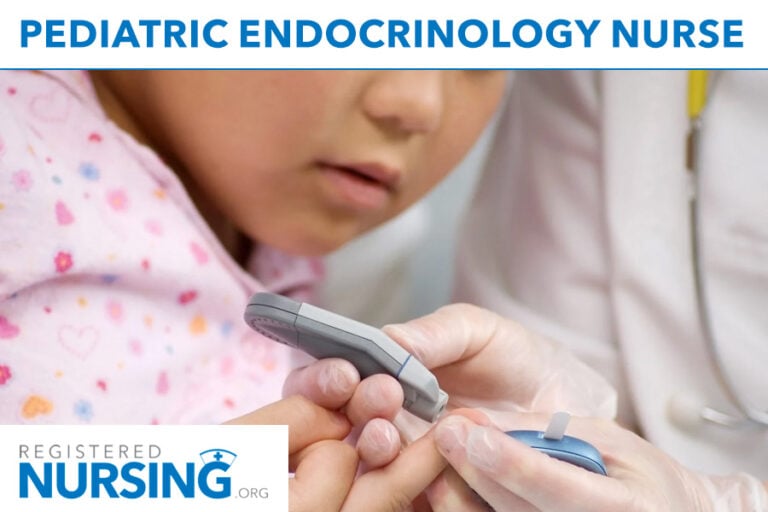Pediatric Endocrinology Nurse

What is a Pediatric Endocrinology Nurse?
A pediatric endocrinology nurse works with children from birth to age eighteen, treating and managing endocrine disorders. The endocrine system produces hormones that help regulate processes that occur in the body, such as breathing, growth, fluid balance, appetite, digestion, weight control, and reproduction. The most common endocrine disorder a pediatric endocrinology nurse will treat is diabetes mellitus, as this condition is seen as young as infancy. Other endocrine disorders the nurse may encounter include hypothyroidism or hyperthyroidism, pituitary problems, adrenal diseases such as Addison's, childhood obesity, and more. Many of these disorders can affect a child's growth and development, thus the nurse works closely with the patient’s parents to educate them on the treatment of the disorder.
How to Become a Pediatric Endocrinology Nurse
Prospective pediatric endocrinology nurses should have experience treating children in a medical setting, and a background in or strong working knowledge of diabetes is also helpful. This type of nurse may see patients over a long period of time to track growth and disease progression, so the ability to form relationships is a must. Excellent communication skills are also paramount since pediatric endocrinology nurses must keep parents up-to-date and help calm children who may be frightened of the necessary tests and procedures they must undergo.
What Are the Schooling Requirements for a Pediatric Endocrinology Nurse?
To become a pediatric endocrinology nurse, the first step is to attend an accredited nursing school and graduate with a Bachelor's Degree in Nursing (BSN). To start working as a nurse, passing the National Council Licensure Examination (NCLEX-RN) to become a licensed RN is required.
Many pediatric endocrinology nursing positions require some experience. To obtain this, the nurse should seek experience in diabetes education, internal medicine, endocrinology, and/or pediatrics to prepare for a career in pediatric endocrinology. A pediatric endocrinology nurse must have strong assessment skills, a foundation in pharmacology, IV skills, a Basic Life Support (BLS) certification, and a Pediatric Advanced Life Support (PALS) certification for a hospital setting.
The nurse may advance their education to become a Nurse Practitioner (NP) specializing or working with endocrine disorders in children. This requires additional schooling at an accredited university and NP licensure via examination.
Are Any Certifications or Credentials Needed?
Currently, there is no specific certification that combines pediatrics and endocrinology into one cohesive certification for RNs or nurse practitioners. There are individual specialty options available, such as becoming a Certified Diabetic Educator, which RNs can opt for.
There are several pediatric certifications for nurse practitioners that could benefit a pediatric nurse working with endocrine disorders. Some of these options include the following:
- Certified Pediatric Nurse Practitioner – Primary Care
- Certified Pediatric Nurse Practitioner – Acute Care
- American Nurse Credentialing Center’s (ANCC) Pediatric Nursing Certification
Learn more about pediatric nurse certifications.
What Does a Pediatric Endocrinology Nurse Do?
A pediatric endocrinology nurse works with the child, their family, and the pediatrician to develop an effective treatment plan to manage the child's endocrine disorder. The nurse will also educate the child's parents regarding how to deal with the child's condition, including medication education, lab testing, and any diet/lifestyle modifications. Depending on the child’s age, this information will also be taught to them directly.
What Are the Roles and Duties of a Pediatric Endocrinology Nurse?
Some duties the nurse may perform include:
- Vital sign assessments
- Physical assessments
- Blood draws for laboratory testing
- Communicating test results to the pediatrician to ensure the plan of care is effective for the patient
- Inserting catheters
- Keeping patient records updated
- Monitoring prescriptions
Where Do Pediatric Endocrinology Nurses Work?
A pediatric endocrinology nurse may work in a hospital setting on a specialized floor that may be solely for pediatric endocrine disorders or for pediatric patients with an array of conditions. The hospital nurse treats acute conditions or symptoms that need to be addressed on an inpatient basis.
A pediatric endocrinology nurse may also work in a pediatrician's or other physician's office. This setting is for less emergent situations and focuses on prevention, education, and ongoing monitoring/management of endocrine disorders.
Pediatric Endocrinology Nurse Salary & Employment
Due to pediatric endocrinology nursing being a specialty, the average salary is higher than that of a regular RN, landing at around $77,000 per year. This salary can increase with more certifications and experience. Overall, job prospects for this field are good, as there is an increasing number of children afflicted with diabetes and endocrine disorders in the United States.
| Average Annual Salary | |
| Lowest 25% of Earners | $60,000 |
| Median | $76,348 |
| Top 25% or Earners | $84,000 |
| Top Earners | $111,500 |








